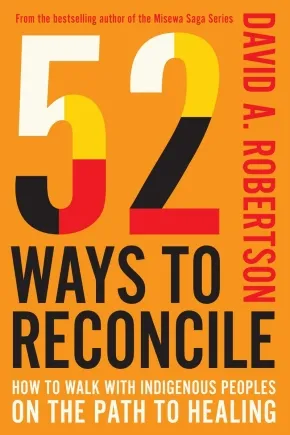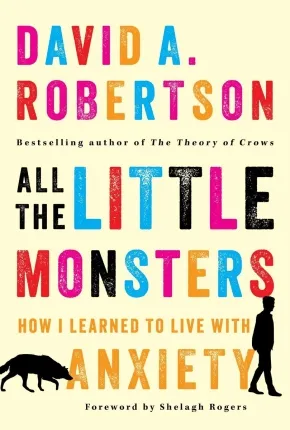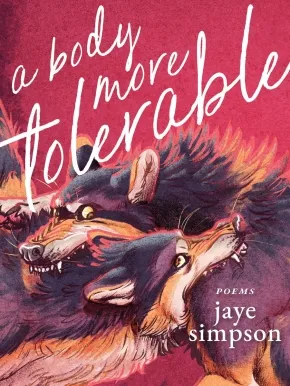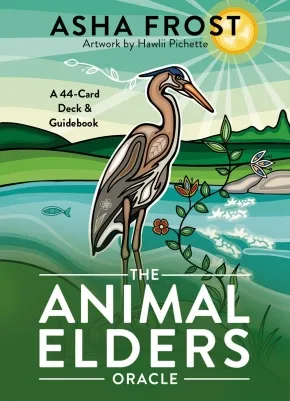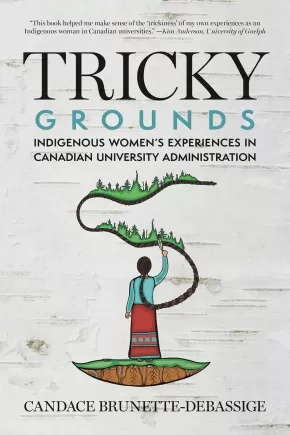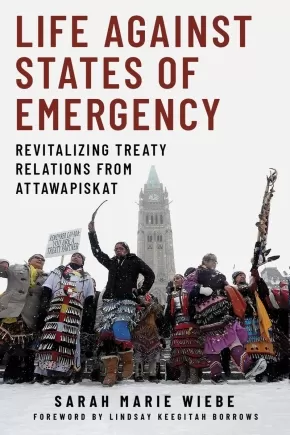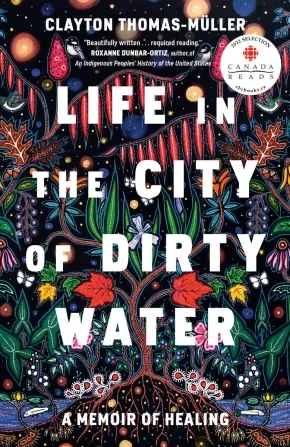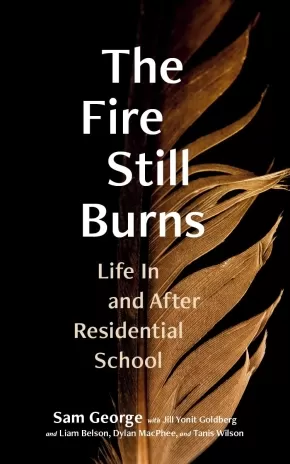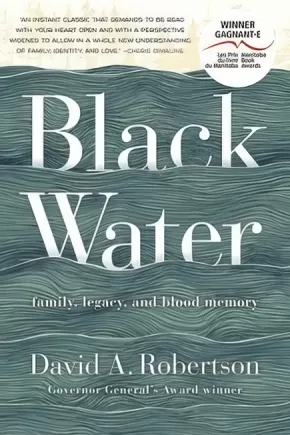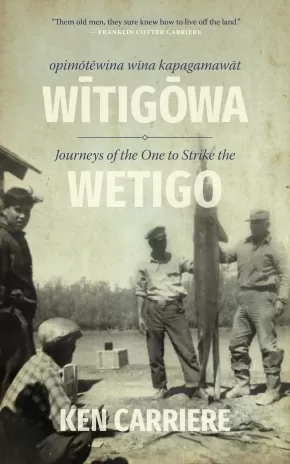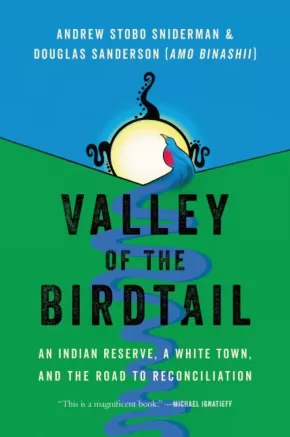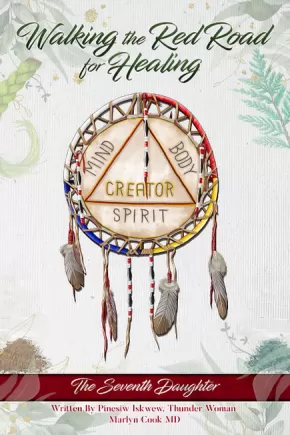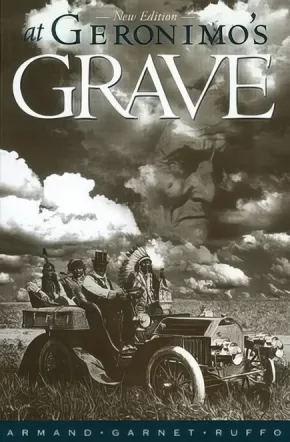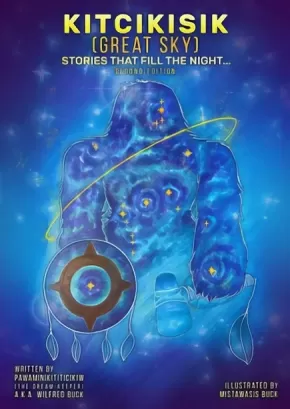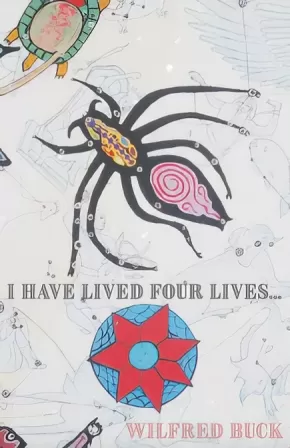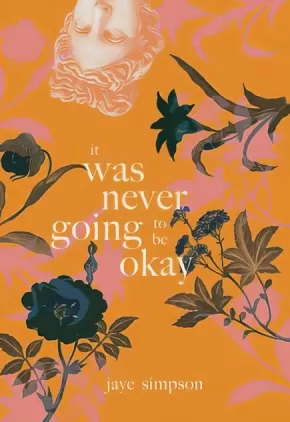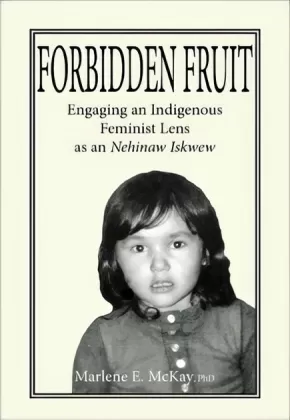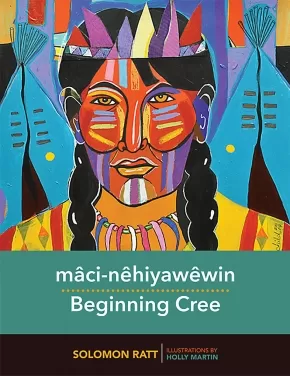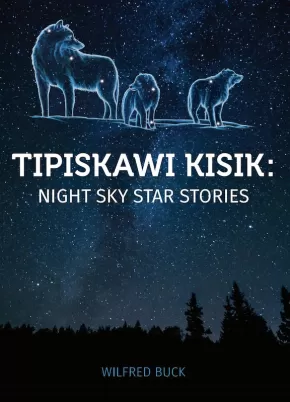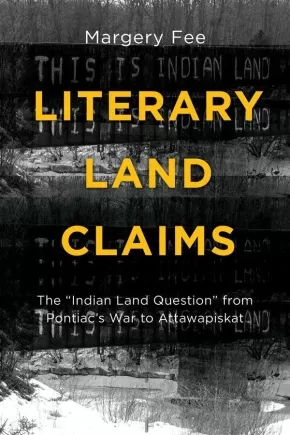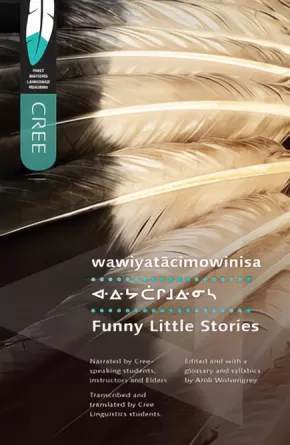
Swampy Cree (Lowland Cree)
1
-
15
of
24 Results;
Sort By
Go To
of 2
Mother Earth: My Favourite Artist Teacher Lesson Plan
$7.99
Artists:
Text Content Territories:
Indigenous Canadian;
ISBN / Barcode: 9781778540622
Synopsis:
Synopsis:
A teacher lesson plan to further explore the book, Mother Earth: My Favourite Artist. May include comprehension questions, group activities, conversation starters, quizzes, language arts activities, and colouring pages.
Have you ever considered Mother Earth to be an artist? A shiny rock, the guiding tracks of a bird, a colourful sunset—what beauty do you see on Mother Earth?
Award-winning Indigenous author, CBC journalist, and Poet Laureate of Saskatchewan (2021-2023) Carol Rose GoldenEagle brings readers a radiant tribute to the artwork within the everyday. Paired with stunning illustrations by Hawlii Pichette, Mother Earth: My Favourite Artist encourages us to share in the simple wonder of nature, and honour the precious magnificence of Mother Earth and all of our relatives.
Educator Information
Find the accompanying children's book here: Mother Earth: My Favourite Artist
Additional Information
15 pages | 8.50" x 11.00" | Loose-Leaf Packet
52 Ways to Reconcile: How to Walk with Indigenous Peoples on the Path to Healing
$25.00
Format:
Hardcover
Text Content Territories:
Indigenous Canadian;
Reading Level: N/A
ISBN / Barcode: 9780771019357
Synopsis:
Synopsis:
From bestselling author of the Misewa Saga series David A. Robertson, this is the essential guide for all Canadians to understand how small and attainable acts towards reconciliation can make an enormous difference in our collective efforts to build a reconciled country.
52 Ways to Reconcile is an accessible, friendly guide for non-Indigenous people eager to learn, or Indigenous people eager to do more in our collective effort towards reconciliation, as people, and as a country. As much as non-Indigenous people want to walk the path of reconciliation, they often aren’t quite sure what to do, and they’re afraid of making mistakes. This book is the answer and the long overdue guide.
The idea of this book is simple: 52 small acts of reconciliation to consider, one per week, for an entire year. They’re all doable, and they’re all meaningful. All 52 steps take readers in the right direction, towards a healthier relationship between Indigenous and non-Indigenous people and a time when we are past trauma. By following these steps, we can live in stronger and healthier communities equally, and respectfully, together.
Additional Information
224 pages | 5.00" x 8.00" | Hardcover
All the Little Monsters: How I Learned to Live with Anxiety
$25.99
Format:
Paperback
Text Content Territories:
Indigenous Canadian; First Nations; Cree (Nehiyawak); Swampy Cree ; Norway House Cree Nation;
Reading Level: N/A
ISBN / Barcode: 9781443472401
Synopsis:
Synopsis:
With humour, warmth and heartbreaking honesty, award-winning author David A. Roberston explores the struggles and small victories of living with chronic anxiety and depression, and shares his hard-earned wisdom in the hope of making other people’s mental health journeys a little less lonely
From the outside, David A. Robertson looks as if he has it all together—a loving family, a successful career as an author, and a platform to promote Indigenous perspectives, cultures and concerns. But what we see on the outside rarely reveals what is happening inside. Robertson lives with “little monsters”: chronic, debilitating health anxiety and panic attacks accompanied, at times, by depression. During the worst periods, he finds getting out of bed to walk down the hall an insurmountable task. During the better times, he wrestles with the compulsion to scan his body for that sure sign of a dire health crisis.
In All the Little Monsters, Robertson reveals what it’s like to live inside his mind and his body and describes the toll his mental health challenges have taken on him and his family, and how he has learned to put one foot in front of the other as well as to get back up when he stumbles. He also writes about the tools that have helped him carry on, including community, therapy, medication and the simple question he asks himself on repeat: what if everything will be okay?
In candidly sharing his personal story and showing that he can be well even if he can’t be “cured,” Robertson hopes to help others on their own mental health journeys.
Additional Information
272 pages | 6.00" x 9.00" | Paperback
a body more tolerable
$19.95
Format:
Paperback
Text Content Territories:
Indigenous Canadian; First Nations; Anishinaabeg; Oji-Cree; Ojibway; Saulteaux; Cree (Nehiyawak); Swampy Cree ; Sapotaweyak Cree Nation;
Reading Level: N/A
ISBN / Barcode: 9781551529677
Synopsis:
Synopsis:
Ferocious and vulnerable poems about redefining acts of creation, destruction, deconstruction, and recreation, from a singular Indigiqueer point of view
a body more tolerable is a collection of powerful and haunting poems combining faerie tales, mythology, and a self-divinized female rage. Divided into three parts, the book examines Indigenous grief, trans identity, and frustrated desires in ways that reject perception. Gone is the soft, kind, gentle girl that author jaye simpson once thought she would become. Instead, she unravels the sticky threads of colonialism with poems that exact lyrical acts of self-surgery.
In these visceral poems, teeth gleam, graze skin, and sink into flesh, becoming bloodied and exposing the animalistic hunger that lies within. Pulsating with yearning and possibility, a body more tolerable is a book that resists typical notions of physicality and sex to dream of a world more divine. It is a call-out into the canon for a new age, one filled with retribution and recompense.
Reviews
"jaye simpson's a body more tolerable is a singular achievement. Her poetic project, at once forward-dawning and ancestral, both revolutionary and decolonizing, is given total expression in this book. These poems moved me immensely; there is so much beauty and feeling power in all of them. No one is writing like jaye simpson." -Billy-Ray Belcourt, author of A Minor Chorus and Coexistenc
"a body more tolerable is a work at once open and lyric, fearless and tender. Expanding grief's territory into moments of relation and desire, simpson also challenges "home, as a wayward theory" into a poetics of self-mothering, of being beyond becoming. This collection is a fierce and resistant nurturing." -Liz Howard, author of Infinite Citizen of the Shaking Tent and Letters in a Bruised Cosmo
"jaye simpson is one of the most compelling and incisive voices of their generation. In a body more tolerable, they seize the English language and command it into an instrument that meticulously sings the realities of their present moment. I found solace, fire, and a relentless love for living and loving in these poetic offerings. a body more tolerable is a wayward map, and it is gorgeous. I'll carry it close to my heart." -Leanne Betasamosake Simpson, author of Noopiming: The Cure for White Ladies
"i can't retire this tongue," jaye simpson writes in a sophomore collection that creeps, howls, floats, shatters. an Indigenous speaker grapples with survival, the foster care system, the body, conceptions of motherhood, and trans girlhood in this heart-wrenching leap that returns what is most precious to us through lush language and keen lyricism. each poem is a portal of longing, ferocity, softness. i can't recommend it enough." -Kinsale Drake, National Poetry Series-winning author of The Sky Was Once a Dark Blanket
Additional Information
88 pages | 6.00" x 8.00" | Paperback
Elements of Indigenous Style: A Guide for Writing By and About Indigenous Peoples - 2nd Edition
$27.95
Editors:
Format:
Paperback
Text Content Territories:
Indigenous Canadian;
Reading Level: N/A
ISBN / Barcode: 9781550599459
Synopsis:
Synopsis:
The groundbreaking Indigenous style guide every writer needs.
The first published guide to common questions and issues of Indigenous style and process for those who work in words and other media is back in an updated new edition. This trusted resource offers crucial guidance to anyone who works in words or other media on how to work accurately, collaboratively, and ethically on projects involving Indigenous Peoples.
Editor Warren Cariou (Métis) and contributing editors Jordan Abel (Nisga’a), Lorena Fontaine (Cree-Anishinaabe), and Deanna Reder (Cree-Métis) continue the conversation started by the late Gregory Younging in his foundational first edition. This second conversation reflects changes in the publishing industry, Indigenous-led best practices, and society at large, including new chapters on author-editor relationships, identity and community affiliation, Two-Spirit and Indigiqueer identities, sensitivity reading, emerging issues in the digital world, and more.
This guide features:
- Twenty-two succinct style principles.
- Advice on culturally appropriate publishing practices, including how to collaborate with Indigenous Peoples, when and how to seek the advice of Elders, and how to respect Indigenous Oral Traditions and Traditional Knowledge.
- Terminology to use and to avoid.
- Advice on specific editing issues, such as biased language, capitalization, citation, accurately representing Indigenous languages, and quoting from historical sources and archives.
- Examples of projects that illustrate best practices.
Additional Information
208 pages | 5.50" x 7.50" | Paperback
The Dialogues: The Song of Francis Pegahmagabow
$22.00
Format:
Paperback
Text Content Territories:
Indigenous Canadian; First Nations; Anishinaabeg; Ojibway; Wasauksing First Nation;
Reading Level: N/A
ISBN / Barcode: 9781989496916
Synopsis:
Synopsis:
In The Dialogues: The Song of Francis Pegahmagabow, award-winning author Armand Garnet Ruffo brings to life not only the story of the famed WWI Indigenous sniper, but also the complexities of telling Indigenous stories. From Manitoulin Island to the trenches of WWI to the stage, Ruffo moves seamlessly through time in these poems, taking the reader on a captivating journey through Pegahmagabow’s story and onto the creation of Sounding Thunder, the opera based on his life. Throughout, Ruffo uses the Ojibwe concept of two-eyed seeing, which combines the strengths of western and Indigenous ways of knowing, and invites the reader to do the same, particularly through the inclusion of the Anishinaabemowin language within the collection. These are poems that challenge western conventions of thinking, that celebrate hope and that show us a new way to see the world.
Additional Information
120 pages | 6.00" x 9.00" | Paperback
The Animal Elders Oracle: A 44-Card Deck & Guidebook of Indigenous Wisdom & Healing Medicine
$25.99
Artists:
Text Content Territories:
Indigenous Canadian; First Nations; Anishinaabeg; Ojibway;
Reading Level: N/A
ISBN / Barcode: 9781401978181
Synopsis:
Synopsis:
Tap into guidance from the animal spirit realm and connect to ancestral wisdom with this transformative 44-card deck and guidebook from Indigenous Medicine Woman and author of You Are the Medicine and The Sacred Medicine Oracle, Asha Frost.
Everything is interconnected. All of creation carries a spirit. Indigenous people have always had a sacred relationship with animals and treated them as honored elders. Animal beings in the spirit realm are part of our spiritual support team as allies and medicine keepers, ready to help, waiting to remind you of your humanity and deep connection to the natural world.
With 44 Elder Animals depicted in a richly detailed traditional Ojibway art style, each card carries its own unique medicine. This deck offers meaningful insights and messages to guide you on your path both from the universe and in the voice of an animal spirit guide from the lands of the Ojibway people—from Elder Artic Hare to Elder Wolf. Whether you're seeking clarity, healing, or a deeper connection to your ancestral lineage, these cards provide a bridge to the spirit world.
Use this deck your rituals and ceremonies, do readings with it for your clients and friends, and share it with your communities. As the medicine ripples out, hold Indigenous people in your heart and honor how their history continues to impact your current reality.
Additional Information
128 pages | 3.50" x 5.00" | Card Deck & Guidebook
Tricky Grounds: Indigenous Women's Experiences in Canadian University Administration
$34.95
Format:
Paperback
Text Content Territories:
Indigenous Canadian; First Nations; Cree (Nehiyawak); Swampy Cree ; Mushkegowuk;
Reading Level: N/A
ISBN / Barcode: 9780889779778
Synopsis:
Synopsis:
Breaks the deafening silence of Indigenous women’s voices in academic leadership positions.
Since the 2015 release of the report on the Truth and Reconciliation Commission of Canada, new Indigenous policies have been enacted in universities and a variety of interconnecting Indigenous senior administrative roles have been created. Many of these newly created roles have been filled by Indigenous women. But what does it mean for Indigenous women to be recruited to Indigenize Western institutions that have not undergone introspective, structural change?
Informed by her own experiences and the stories of other Indigenous women working in senior administrative roles in Canadian universities, Candace Brunette-Debassige explores the triple-binding position Indigenous women often find themselves trapped in when trying to implement reconciliation in institutions that remain colonial, Eurocentric, and male-dominated. The author considers too the gendered, emotional labour Indigenous women are tasked with when universities rush to Indigenize without the necessary preparatory work of decolonization.
Drawing on an Indigenous feminist decolonial theoretical lens and positioning Indigenous story as theory, Brunette-Debassige illustrates how Indigenous women can and do preserve and enact their agency through resistance, and help lead deeper transformative changes in Canadian universities. Ultimately, her work provides a model for how reconciliation and Indigenization can be done at an institutional level.
Reviews
“This book helped me make sense of the ‘trickiness’ of my own experiences as an Indigenous woman in Canadian universities.” —Kim Anderson, University of Guelph
Additional Information
320 pages | 6.00" x 9.00" | Paperback
Life against States of Emergency: Revitalizing Treaty Relations from Attawapiskat
$35.95
Format:
Paperback
Text Content Territories:
Indigenous Canadian; First Nations; Cree (Nehiyawak); Swampy Cree ; Attawapiskat;
Reading Level: N/A
ISBN / Barcode: 9780774867887
Synopsis:
Synopsis:
For six weeks in 2012–13, Attawapiskat chief Theresa Spence undertook a high-profile ceremonial fast to advocate for improved Canadian-Indigenous relations. Life against States of Emergency responds to the central question she asked the Canadian public to consider: What does it mean to be in a treaty relationship today? This incisive research weaves together community-engaged research, Attawapiskat lived experiences, discourse analysis, ecofeminist and Indigenous studies scholarship, art, activism, and storytelling to advance a transformative, future-oriented approach to treaty relations. By centring community voices, Life against States of Emergency seeks to cultivate democratic dialogue about environmental justice.
Reviews
"Wiebe’s book is rich, thoughtful, and wise. It centres Indigenous realities and theories, allowing readers to understand how the past informs the present, why representation matters, and how to move collectively toward an environmentally just future."— Jocelyn Thorpe, director of the Centre for Creative Writing and Oral Culture at the University of Manitoba
Additional Information
312 pages | 6.00" x 9.00" | 19 b&w photos, 1 map | Paperback
Life in the City of Dirty Water: A Memoir of Healing (PB)
$19.95
Format:
Paperback
Text Content Territories:
Indigenous Canadian; First Nations; Cree (Nehiyawak); Swampy Cree ; Mathias Colomb First Nation;
ISBN / Barcode: 9780735240087
Synopsis:
Synopsis:
An electrifying memoir that braids together the urgent issues of Indigenous rights and environmental policy, from a nationally and internationally recognized activist and survivor.
There have been many Clayton Thomas-Mullers: The child who played with toy planes as an escape from domestic and sexual abuse, enduring the intergenerational trauma of Canada's residential school system; the angry youngster who defended himself with fists and sharp wit against racism and violence, at school and on the streets of Winnipeg and small-town British Columbia; the tough teenager who, at 17, managed a drug house run by members of his family, and slipped in and out of juvie, operating in a world of violence and pain.
But behind them all, there was another Clayton: the one who remained immersed in Cree spirituality, and who embraced the rituals and ways of thinking vital to his heritage; the one who reconnected with the land during summer visits to his great-grandparents' trapline in his home territory of Pukatawagan in northern Manitoba.
And it's this version of Clayton that ultimately triumphed, finding healing by directly facing the trauma that he shares with Indigenous peoples around the world. Now a leading organizer and activist on the frontlines of environmental resistance, Clayton brings his warrior spirit to the fight against the ongoing assault on Indigenous peoples' lands by Big Oil.
Tying together personal stories of survival that bring the realities of the First Nations of this land into sharp focus, and lessons learned from a career as a frontline activist committed to addressing environmental injustice at a global scale, Thomas-Muller offers a narrative and vision of healing and responsibility.
Reviews
“Clayton Thomas-Müller—Cree poet and environmental warrior dedicated to decolonization—has crafted an awesome, lyrical memoir that captures the experiences of urban Indigenous youth facing poverty, drugs, alcohol, domestic violence, and juvenile detention. Most, like Clayton, inherited the intergenerational trauma of residential schools. Clayton found a way to escape trauma and poverty in order to fight for his people. This beautifully written book is required reading for everyone who cares about justice for the survivors of genocide who continue to survive in colonized conditions. It offers a path to liberation that may also be the way to saving the earth and humanity itself.” — Roxanne Dunbar-Ortiz, author of An Indigenous Peoples’ History of the United States
“This book is an adventure story in every way. A life of drug dealers and crackhouses and guns; leaving that behind for a remarkable time of spiritual and personal growth; and there’s the ongoing adventure of working desperately to protect the planet and its sacred places. Clayton Thomas-Müller relates these adventures in ways that will help everyone through unfamiliar terrain—he’s a trustworthy guide and an authentic storyteller. In a moment when Indigenous people around the world are coming to the very fore of the most crucial fights, this volume will broaden your understanding in powerful ways. And you won’t forget its scenes any time soon.”—Bill McKibben, co-founder of 350.org and author of Earth and Oil and Honey
Additional Information
240 pages | 5.19" x 7.97" | Paperback
The Fire Still Burns: Life In and After Residential School
$21.95
Format:
Paperback
Text Content Territories:
Indigenous Canadian; First Nations; Salish; Coast Salish; Squamish;
Reading Level: N/A
ISBN / Barcode: 9780774880855
Synopsis:
Synopsis:
“My name is Sam George. In spite of everything that happened to me, by the grace of the Creator, I have lived to be an Elder.”
The crimes carried out at St. Paul’s Indian Residential School in North Vancouver scarred untold numbers of Indigenous children and families across generations. Sam George was one of these children. This candid account follows Sam from his idyllic childhood growing up on the Eslhá7an (Mission) reserve to St. Paul’s, where he weathered physical, emotional, and sexual abuse. He spent much of his life navigating the effects of this trauma – prison, addiction, and challenging relationships – until he found the strength to face his past. Now an Elder and educator with the Indian Residential School Survivors Society, this is Sam’s harrowing story, in his own words. An ember of Sam’s spirit always burned within him, and even in the darkest of places he retained his humour and dignity.
The Fire Still Burns is an unflinching look at the horrors of a childhood in the Indian Residential School system and the long-term effects on survivors. It illustrates the healing power of one’s culture and the resilience that allows an individual to rebuild a life and a future.
This frank and powerful personal story of trauma and resilience will bring a greater understanding to all readers – Indigenous and non-Indigenous alike – of residential schools and the impact they had on those who were forced to attend them.
Reviews
"I am glad that Sam George has lent his voice to the many voices of survivors now surfacing from residential "schools". I love the way Sam describes his traditional life before he was forced to go to the school and then later goes back to his culture to overcome the trauma he endured. Sam did time in jail for a crime he committed, but the real crime is that our Indigenous way of life was interfered with, and that created the dysfunction in our communities. This book shows that we had it right all along – Indigenous culture is our saviour."— Bev Sellars, author of They Called Me Number One: Secrets and Survival at an Indian Residential School
"Brutally frank yet disarmingly subtle, sensitive, and funny, The Fire Still Burns by Sam George offers an unflinching look at the human dimensions of Canada’s attempted genocide of Indigenous Peoples through residential schooling." — Sam McKegney, author of Carrying the Burden of Peace: Reimagining Indigenous Masculinities through Story
Educator Information
Table of Contents
Preface / Sam George
Acknowledgments
A Note on the Text
1 Your Name Is T'seatsultux
2 In Them Days
3 Our Lives Signed Away
4 The Strap
5 A Girl Named Pearl, a Boy Named Charlie
6 Runaway
7 I Tried to Be Invisible
8 Finding Ways to Feel Good
9 On Our Own
10 Oakalla
11 Haney Correctional
12 Longshoreman
13 Misery Loves Company
14 Drowning
15 Tsow-Tun Le Lum
16 I’m Still Here
Afterword: On Co-Writing Sam George’s Memoir / Jill Yonit Goldberg
Reader’s Guide
About the Authors
Additional Information
152 pages | 5.00" x 8.00" | Paperback
Black Water: Family, Legacy, and Blood Memory (PB)
$21.00
Format:
Paperback
Text Content Territories:
Indigenous Canadian; First Nations; Cree (Nehiyawak); Swampy Cree ; Norway House Cree Nation;
Reading Level: n/a
ISBN / Barcode: 9781443457781
Synopsis:
Synopsis:
A son who grew up away from his Indigenous culture takes his Cree father on a trip to their family's trapline, and finds that revisiting the past not only heals old wounds but creates a new future.
The son of a Cree father and a non-Indigenous mother, David A. Robertson was raised with virtually no knowledge or understanding of his family’s Indigenous roots. His father, Don, spent his early childhood on a trapline in the bush northeast of Norway House, Manitoba, where his first teach was the land. When his family was moved permanently to a nearby reserve, Don was not permitted to speak Cree at school unless in secret with his friends and lost the knowledge he had been gifted while living on his trapline. His mother, Beverly, grew up in a small Manitoba town with not a single Indigenous family in it. Then Don arrived, the new United Church minister, and they fell in love.
Structured around a father-son journey to the northern trapline where Robertson and his father will reclaim their connection to the land, Black Water is the story of another journey: a young man seeking to understand his father's story, to come to terms with his lifelong experience with anxiety, and to finally piece together his own blood memory, the parts of his identity that are woven into the fabric of his DNA.
Reviews
“An instant classic that demands to be read with your heart open and with a perspective widened to allow in a whole new understanding of family, identity, and love.” — Cherie Dimaline
“When someone lives their life in a good way, the Haisla call them handsome people. David A. Robertson’s biography is the perfect example of someone who takes care with his words and speaks respectfully; he tackles identity and racism, family bonds and breaks, with nuance and honesty. The power of this approach makes Black Water an essential and timely book.” — Eden Robinson, bestselling author of The Trickster Trilogy
Additional Information
288 pages | 5.31" x 8.00" | Paperback
Opimōtēwina wīna kapagamawāt Wītigōwa / Journeys of The One to Strike the Wetigo
$24.95
Format:
Paperback
Text Content Territories:
Indigenous Canadian; First Nations; Cree (Nehiyawak); Swampy Cree ; Woodland Cree; Rocky Cree; Peter Ballantyne Cree Nation;
Grade Levels: 12; University/College;
ISBN / Barcode: 9780889779044
Synopsis:
Synopsis:
A first-hand account of a Swampy Cree boy’s experiences growing up in the Saskatchewan River Delta, one of the world’s largest inland deltas and one of North America’s most important ecosystems.
Depicting an Indigenous lifestyle that existed in Northern Saskatchewan way past the Fur Trade era, Ken Carriere shares his first-hand account of experiences as a young boy helping his father trapping, fishing, and hunting in the Saskatchewan River Delta.
Opimōtēwina wīna kapagamawāt Wītigōwa / Journeys of The One to Strike the Wetigo contains interviews with elders, stories, personal photographs, and poetry, along with some original Swampy Cree translations.
Creating a vivid portrait of what it was like to live off the land, Carriere also reveals how hydro-electric dams and other Western endeavours have impacted the livelihoods of so many Northern communities.
Reviews
"Wow! This is an excellent resource for those engaged in, or interested in, land-based education. It gives a wonderful, engaging account of living on the land in the past and, to some extent, in the present day. It's also a good resource for N-dialect speakers." —Solomon Ratt, author of The Way I Remember and Beginning Cree
Additional Information
328 pages | 5.00" x 8.00" | Paperback
Valley of the Birdtail: An Indian Reserve, a White Town, and the Road to Reconciliation
$36.99
Format:
Hardcover
Text Content Territories:
Indigenous Canadian; First Nations;
ISBN / Barcode: 9781443466301
Synopsis:
Synopsis:
A heart-rending true story about racism and reconciliation.
Divided by a beautiful valley and 150 years of racism, the town of Rossburn and the Waywayseecappo Indian reserve have been neighbours nearly as long as Canada has been a country. Their story reflects much of what has gone wrong in relations between Indigenous Peoples and non-Indigenous Canadians. It also offers, in the end, an uncommon measure of hope.
Valley of the Birdtail is about how two communities became separate and unequal—and what it means for the rest of us. In Rossburn, once settled by Ukrainian immigrants who fled poverty and persecution, family income is near the national average and more than a third of adults have graduated from university. In Waywayseecappo, the average family lives below the national poverty line and less than a third of adults have graduated from high school, with many haunted by their time in residential schools.
This book follows multiple generations of two families, one white and one Indigenous, and weaves their lives into the larger story of Canada. It is a story of villains and heroes, irony and idealism, racism and reconciliation. Valley of the Birdtail has the ambition to change the way we think about our past and show a path to a better future.
Reviews
"Meticulously researched and written with compassion, Valley of the Birdtail draws two parallel lines hopelessly distant, and then shows us a pathway through which they can come together. It’s a work of trauma, of broken relationships, of how we perceive one another, but ultimately, it’s a story of possibility and healing." — David A. Robertson, author of Black Water: Family, Legacy, and Blood Memory
"This is a magnificent book. It’s a new history of Canada, as lived in two communities—Rossburn and Waywayseecappo—who shared the same valley but never lived the same reality. I am haunted by what I learned and touched by the hope that these communities can teach us all how to live together in peace and justice. A truly extraordinary achievement: peeling back the layers of the history, searching through the records, but never once losing the characters, the detail, the grit of lives lived. I'm just so impressed." — Michael Ignatieff, author of On Consolation: Finding Solace in Dark Times
Additional Information
384 pages | 6.00" x 9.00" | Hardcover
Walking the Red Road for Healing: The Seventh Daughter
$29.99
Format:
Paperback
Text Content Territories:
Indigenous Canadian; First Nations; Cree (Nehiyawak); Swampy Cree ; Misipawistik Cree Nation;
Grade Levels: 12; University/College;
ISBN / Barcode: 9781990297243
Synopsis:
Synopsis:
Pinesiw Iskwew, Thunder Woman, Dr. Marlyn Cook, member of Misipawistik Cree Nation is the author of Walking the Red Road for Healing. This book is based on her life and journey as a Cree Woman, Pipe Carrier, Sundancer, Sweat Lodge Keeper, and medical doctor (graduate MD 1987). She believes the approach for healing must be holistic and that our Traditional Healers work alongside physicians in our Indigenous communities. Dr. Marlyn Cook shares her own experiences of colonialism and how this affected her, her family and her community. Through her reflections of her Indigenous Knowledge, her Traditional Teachings of Ceremonies and Medicines, she acknowledges the resilience of communities in their healing and provides ways to heal. Dr. Cook’s intention in this powerful book is to bring us together in Truth and Reconciliation. This book will resonate with health, social, and justice prac
Educator Information
Keywords / Themes: Adult Education, Health & Healing, Traditional Teachings, Indigenous Knowledge, Truth and Reconciliation.
Additional Information
Pages: 200 | Paperback
At Geronimo's Grave
$18.00
Format:
Paperback
Text Content Territories:
Indigenous American; Native American; Apache; Chiricahua; Indigenous;
Reading Level: N/A
ISBN / Barcode: 9781989496350
Synopsis:
Synopsis:
Geronimo is probably the second-best-known Indigenous name, after Pocahontas. But the reality of the great Apache warrior's fate is little remembered. In At Geronimo's Grave, Armand Garnet Ruffo uses the Apache warrior's life as a metaphor for the lives of many of the abandoned Indigenous people on this continent. With affection and concern, award-winning poet Armand Garnet Ruffo uses straightforward language to examine the lives and experiences of people who struggle to make their way in a world that has no place for them, starting with Geronimo himself. Feared for his once-great prowess, the warrior horseman was reduced to wearing a top hat and riding in an early Ford Model T car, a grim caricature of assimilation into the dominant culture. The bitter irony of this fate echoes through the personal poems in At Geronimo's Grave. This collection is a love letter to a people trapped in the slow-moving vehicle of another culture that is taking them nowhere.
Reviews
"Armand Ruffo spins silky songs out of everyday language. They thread the separations between the dead and the living, between the heirs of Columbus and his 'Indians,' between families and their children, joining the awkward edges always with hope, often with beauty." – Daniel David Moses
Additional Information
116 pages | 6.00" x 9.00" | Paperback
Kitcikisik: (Great Sky) Tellings That Fill the Night Sky
$22.95
Artists:
Format:
Paperback
Text Content Territories:
Indigenous Canadian; First Nations; Cree (Nehiyawak);
ISBN / Barcode: 9781990297038
Synopsis:
Synopsis:
Pawaminikititicikiw, Wilfred Buck, is an Ininew / Cree, Knowledge and Dream Keeper of the Opaskwayak Cree Nation of Northern Manitoba. He is the author of Tipiskawi Kisik: Night Sky Star stories, and I Have Lived Four Lives, a memoir. Kitcikisik (Great Sky) features Indigenous Star Knowledge and is the second edition of Tipiskawi Kisik.
Educator Information
Recommended by the publisher for grades 7+
Additional Information
86 Pages
I Have Lived Four Lives...
$24.00
Format:
Paperback
Text Content Territories:
Indigenous Canadian; First Nations; Cree (Nehiyawak); Swampy Cree ; Opaskwayak;
ISBN / Barcode: 9781927886496
Synopsis:
Synopsis:
In this unique collection of writings from Ininew Dream Keeper (Pawami niki titi cikiw) Wilfred Buck, he illustrates through astounding stories, four separate stages of personal experience. The stories in I Have Lived Four Lives... are designed as aids to assist in discovery and healing for Indigenous youth, but instead of being didactic, they encompass a range of hilarious and vivid recollections that revolve around visions and dreams, and that ultimately trace Buck's path to becoming a teacher in Indigenous cosmology and astronomy. Beginning by explaining how the word Ininew refers to the phrase mixing of four, Buck embarks upon this series of dazzling stories: herein is the story of how I lived and how I died and how I lived again along with the dreams I have dreamed and the visions I have seen.
Additional Information
6.00" x 9.00"
it was never going to be okay
$18.95
Format:
Paperback
Text Content Territories:
Indigenous Canadian; First Nations; Anishinaabeg; Oji-Cree; Ojibway; Saulteaux; Cree (Nehiyawak); Swampy Cree ; Sapotaweyak Cree Nation;
Grade Levels: 12; University/College;
ISBN / Barcode: 9780889713826
Synopsis:
Synopsis:
it was never going to be okay is a collection of poetry and prose exploring the intimacies of understanding intergenerational trauma, Indigeneity and queerness, while addressing urban Indigenous diaspora and breaking down the limitations of sexual understanding as a trans woman. As a way to move from the linear timeline of healing and coming to terms with how trauma does not exist in subsequent happenings, it was never going to be okay tries to break down years of silence in simpson’s debut collection of poetry:
i am five
my sisters are saying boy
i do not know what the word means but—
i am bruised into knowing it: the blunt b,
the hollowness of the o, the blade of y
Awards
- 2021 Indigenous Voices Awards winner for Published Poetry in English.
Reviews
"jaye simpson’s it was never going to be okay is a symphony of unrelenting rage and undying hope that beckons to be heard, seen and held with the utmost care. In this stunning debut they speak truths to the complexities of the body, land and memory through an intimately structured and poignant cadence. This collection will leave you longing for more and, in the legacy of trans Indigenous literature, change lives." — Arielle Twist, author of Disintegrate/Dissociate
"jaye simpson marshals a vast economy of images because their subject matter is as large as an entire country, as the colonial past, as structures of oppression and indifference that undermine Indigenous and trans livability. At the level of craft, simpson makes use of the codes of tragedy, polemic, autobiography and the lyric artfully and powerfully. By the book’s end, buoyed by its final beautiful and tender section, a kind of love letter to trans Indigenous peoples, one is called on to build a new world. In this way, jaye simpson's poetry is a vital artifact of a decolonial future!" — Billy-Ray Belcourt, 2018 Griffin Poetry Prize winner for This Wound Is a World
Additional Information
112 pages | 5.50" x 8.00"
Forbidden Fruit: Engaging an Indigenous Feminist Lens as an Nehinaw Iskwew (4 in Stock, Out of Print)
$23.00
Format:
Paperback
Text Content Territories:
Indigenous Canadian; First Nations; Cree (Nehiyawak); Swampy Cree ;
Grade Levels: University/College;
ISBN / Barcode: 9781926476254
Synopsis:
Synopsis:
Forbidden Fruit: Engaging an Indigenous Feminist Lens as an Neninaw Iskwew is a feminist based memoir acknowledging that people are measured, categorized, and placed in a hierarchal order that is deeply influenced by discourses predicated upon social processes.
Dr. McKay’s Indigenous feminism is about being aware that due to the colonial patriarchy that has seeped through Indigenous social and cultural systems, Indigenous women are positioned differently in economic, social and political structures. Marlene masterfully uses her own life experiences to assert that colonialism and Indigenous cultures obscure the role of women in a way that continues both their marginalization and the binary of the princess/squaw (p. 11).
Additional Information
98 pages | 6.00" x 9.00"
mâci-nêhiyawêwin: Beginning Cree
$34.95
Artists:
Format:
Coil Bound
Text Content Territories:
Indigenous Canadian; First Nations; Cree (Nehiyawak);
ISBN / Barcode: 9780889774353
Synopsis:
Synopsis:
Designed as an introduction for Cree language learners, Beginning Cree acts as a self-study aid--a much-needed resource in today's world where most students cannot speak Cree fluently. Basic grammar units and everyday vocabulary items guide the student through the building blocks of the language, and expansion drills and exercises reinforce lessons and prepare the student for further study. With over 100 delightful illustrations, Beginning Cree grounds the language in traditional and contemporary contexts.
Educator & Series Information
This book is recommended for ages 12+.
Table of Contents
Chapter One: Introduction
Chapter Two: Nouns
Chapter Three: Prepositions and Pronouns
Chapter Four: Animate Intransitive Verbs
Chapter Five: Inanimate Intransitive Verbs
Chapter Six: Possessives: Kinship Terms
Chapter Seven: Transitive Inanimate Verbs
Chapter Eight: Transitive Animate Verbs
Verb Charts
Conjugation Patterns
Vocabulary List
Bibliography
Notes
The Canadian Indigenous Books for School list recommends this resource for Grades 1-12 for these subject areas: Indigenous Language Studies, Language Studies.
Part of the Indigenous Languages for Beginners series.
The book is specifically geared towards learners of the Plains Cree "Y" dialect, also known as the "Y" dialect.
Additional Information
165 pages | 8.50" x 11.00" | black and white illustrations | spiral bound
Tipiskawi Kisik: Night Sky Star Stories
$15.00
Format:
Paperback
Text Content Territories:
Indigenous Canadian; First Nations; Cree (Nehiyawak);
ISBN / Barcode: 9781927849460
Synopsis:
Synopsis:
Like the night sky above, Tipiskawi Kisik holds a myriad of tales rooted in an Ininew (Cree) perspective. An exploration of stars and constellations—and their associated mythologies—will greet you with age-old knowledge held by Indigenous people prior to European contact. Through Wilfred Buck’s creative, spiritual, and intelligent understanding of the stars, it will be easy to imagine yourself flying inside the Milky Way with Niska (the Goose) or chasing Mista Muskwa (the Great Bear), just like Tepakoop Pinesisuk (the Seven Birds). Above all, these stories can be passed on to the next generation, so they will know of the rich history, science practices, and culture of the Ininew people.
Additional Information
This is a collection of short stories (approximately 25 pages long) with supporting artwork/illustrations. While not aimed at young readers in terms of reading level, this book would support educators in their teaching of Indigenous astronomy to younger audiences, especially since each short story would work well as a read aloud and includes useful illustrations/diagrams of the night sky.
Literary Land Claims: The 'Indian Land Question' from Pontiac’s War to Attawapiskat (1 in Stock) - ON SALE
$20.00 $38.99
Format:
Paperback
Text Content Territories:
Indigenous Canadian;
Grade Levels: University/College;
ISBN / Barcode: 9781771121194
Synopsis:
Synopsis:
Literature not only represents Canada as “our home and native land” but has been used as evidence of the civilization needed to claim and rule that land. Indigenous people have long been represented as roaming “savages” without land title and without literature. Literary Land Claims: From Pontiac’s War to Attawapiskat analyzes works produced between 1832 and the late 1970s by writers who resisted these dominant notions.
Margery Fee examines John Richardson’s novels about Pontiac’s War and the War of 1812 that document the breaking of British promises to Indigenous nations. She provides a close reading of Louis Riel’s addresses to the court at the end of his trial in 1885, showing that his vision for sharing the land derives from the Indigenous value of respect. Fee argues that both Grey Owl and E. Pauline Johnson’s visions are obscured by challenges to their authenticity. Finally, she shows how storyteller Harry Robinson uses a contemporary Okanagan framework to explain how white refusal to share the land meant that Coyote himself had to make a deal with the King of England.
Fee concludes that despite support in social media for Theresa Spence’s hunger strike, Idle No More, and the Indian Residential School Truth and Reconciliation Commission, the story about “savage Indians” and “civilized Canadians” and the latter group’s superior claim to “develop” the lands and resources of Canada still circulates widely. If the land is to be respected and shared as it should be, literary studies needs a new critical narrative, one that engages with the ideas of Indigenous writers and intellectuals.
Awards
Finalist for the 2015 ACQL Gabrielle Roy Prize for Literary Criticism.
Reviews
Fee contributes to the decolonization of literary studies in Canada and readers will benefit from Fee's contextualization of Indigenous notions of land rights and language. ... scholars interested in issues related to decolonization and Indigenous sovereignty will find this work especially useful. — Lianne Leddy, H-Envirnoment, November -0001
Literary Land Claims is an extremely important contribution to conversations about literature in Canada. ... At a time when universities across Canada are endeavouring to heed the Truth and Reconciliation Commission’s “Calls to Action,” Fee points readers toward a goal of consensus building, one that is predicated on muddying the binary and hierarchical logics through which we have tended to understand identity and, indeed, colonialism itself. She opens up an engaging and necessary conversation, offering a model for rich, ethical scholarly engagement with a literary landscape that is extends far beyond this book, and beyond the confines of “Canlit.” — Sarah Krotz, English Studies in Canada
... Literary Land Claims is timely reading. ... a rich and thoughtful book which will appeal to anyone writing or teaching in fields relating to settler-colonial, Canadian, and Indigenous studies. Historians in particular will find Fee’s chapters a valuable complement to the original texts she discusses. — Megan Harvey, BC Studies, November -0001
Educator Information
This book would be useful for the following subject areas or courses: Literary Criticism, Social Science, Canadian Literature, Canadian History, Indigenous Studies.
Additional Information
326 pages | 6.00" x 9.00" | 10 black and white illustrations
Funny Little Stories / wawiyatacimowinisa (1 in stock, in reprint)
$12.95
Editors:
Format:
Paperback
Text Content Territories:
Indigenous Canadian; First Nations; Cree (Nehiyawak); Plains Cree; Swampy Cree ; Woodland Cree;
ISBN / Barcode: 9780889771857
Synopsis:
Synopsis:
This is the first in a series of readers in the First Nations languages of the prairie provinces meant for language learners and language users. The stories in this volume come from a variety of sources, all being narrated or written by fluent speakers of Cree, whether students or instructors of the Cree language or Elders. Funny Little Stories is a collection of nine stories representing the Plains Cree, Woods Cree, and Swampy Cree dialects, with a pronunciation guide and a Cree-to-English glossary.
Students and Elders come together in this volume to offer samples of three distinct genres of Cree storytelling: word play, humorous accounts of life experiences, and traditional stories about Wisahkecahk, the trickster-hero.
Each story is illustrated and is presented in both Standard Roman Orthography and syllabics, with English translation.
Educator & Series Information
Funny Little Stories is part of the First Nations Language Readers series. With a mix of traditional and new stories, each First Nations Language Reader introduces an Indigenous language and demonstrates how each language is used today. The University of Regina Press’s long-term goal is to publish all 60+ Indigenous languages of Canada.
Additional Information
110 pages | 5.50" x 8.50" | Narrated by Cree-speaking students, instructors, and Elders | Transcribed and Translated by Cree Linguistics Students | Edited and with a glossary and syllabics by Arok Wolvengrey
Authenticity Note: Because of the contribution of Indigenous Peoples, such as Cree-speaking Elders, to this work on Cree storytelling, it has received the Authentic Indigenous Text label.
Sort By
Go To
of 2




